#conflict in sri lanka
Explore tagged Tumblr posts
Text
@chaoticjoke | { hehe. }
─────⋅☾ ☽⋅─────
"You think so?" The doctor gives a little hum. Very contemplative. "Well, maybe someday you could give a speech over in Sri Lanka. Relay your experience. Might've just solved their crisis - if the elephants agree, that is."
General air of apathy about the room. That's okay; what else does a licensed psychologist expect from a self-evident case of textbook psychopathy? The professor in him would love a good look at the other potentials, of course, no question. All in good time. So Crane cants his head, breathes that abstract tinge that seems so uncanny after one has been soaking so, so (dreadfully) long in the perfume-bath to which society has succumbed.
The Joker is far from naked. Stripped of his usual fashions and fare, drugged, even so far as chained. Yet still he's a centerpiece to be thoroughly deconstructed, analyzed, criticized, brutalized. . . .
Crane's dark brow twitches of its own accord. "I think they got your height wrong." Ought to be the first matter at hand; no, all the rest is unsurprising, expected, herein is where the discrepancy lies: "Five foot ten. No, no. You're at least two inches taller. Three?"

Ice-blues that miss nothing. Eyes like carbon dioxide, frozen.
"Mmm. Such a careless lot, here at Arkham. That just won't do. No, I wouldn't be surprised in the least if you fell out of here in twenty-four hours flat. Say - do you feel that you experience fear?"
#chaoticjoke#{ poor guy. pat pat }#{ i'm going to remember to rb next time }#{ new posts out of habit what can i do ┐ (´ー` )┌ }#{ (fun fact there's a lot of human v. elephant conflict happening in sri lanka. the more you know™ folks) }#j. crane | nolanv.#j. j. | clutching at straws
1 note
·
View note
Text
The Seven Moons of Maali Almeida
This Booker prize winner of 2022 delves into the history of Sri Lanka. The photographer Maali is already dead, but he has seven moons of wandering around before he leaves the world. The book actually throws light on the different groups in Sri Lanka, ethnic conflicts and civil war. It is interesting but by the time I reached the fifth moon, it seemed repetitive, with headless bodies constantly…

View On WordPress
#book review.#Booker prize#books#conflict#Shehan Karunatilaka#Sri Lanka#The Seven Moons of Maali Almeida#war
1 note
·
View note
Text
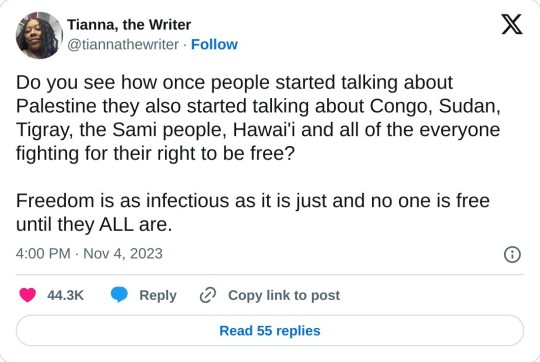
People & countries mentioned in the thread:
DR Congo - M23, Cobalt
Darfur, Sudan - International Criminal Court, CNN, BBC (Overview); Twitter Explanation on Sudan
Tigray - Human Rights Watch (Ethnic Cleansing Report)
the Sámi people - IWGIA, Euronews
Hawai'i - IWGIA
Syria - Amnesty International
Kashmir- Amnesty Summary (PDF), Wikipedia (Jammu and Kashmir), Human Rights Watch (2022)
Iran - Human Rights Watch, Morality Police (Mahsa/Jina Amini - Al Jazeera, Wikipedia)
Uyghurs - Uyghur Human Rights Project (UHRP) Q&A, Wikipedia, Al Jazeera, UN Report
Tibetans - SaveTibet.org, United Nations
Yazidi people - Wikipedia, United Nations
West Papua - Free West Papua, Genocide Watch
Yemen - Human Rights Watch (Saudi border guards kill migrants), Carrd
Sri Lanka (Tamils) - Amnesty International, Human Rights Watch
Afghans in Pakistan - Al Jazeera, NPR
Ongoing Edits: more from the notes / me
Armenians in Nagorno-Karabakh/Azerbaijan (Artsakh) - Global Conflict Tracker ("Nagorno-Karabakh Conflict"), Council on Foreign Relations, Human Rights Watch (Azerbaijan overview), Armenian Food Bank
Baháʼís in Iran - Bahá'í International Community, Amnesty, Wikipedia, Minority Rights Group International
Kafala System in the Middle East - Council on Foreign Relations, Migrant Rights
Rohingya - Human Rights Watch, UNHCR, Al Jazeera, UNICEF
Montagnards (Vietnam Highlands) - World Without Genocide, Montagnard Human Rights Organization (MHRO), VOA News
Ukraine - Human Rights Watch (April 2022), Support Ukraine Now (SUN), Ukraine Website, Schools & Education (HRW), Dnieper River advancement (Nov. 15, 2023 - Ap News)
Reblogs with Links / From Others
Indigenous Ppl of Canada, Cambodia, Mexico, Colombia
Libya
Armenia Reblog 1, Armenia Reblog 2
Armenia, Ukraine, Central African Republic, Indigenous Americans, Black ppl (US)
Rohingya (Myanmar)
More Hawai'i Links from @sageisnazty - Ka Lahui Hawaii, Nation of Hawai'i on Soverignty, Rejected Apology Resolution
From @rodeodeparis: Assyrian Policy Institute, Free Yezidi
From @is-this-a-cool-url: North American Manipur Tribal Association (NAMTA)
From @dougielombax & compiled by @azhdakha: Assyrians & Yazidis
West Sahara conflict
Last Updated: Feb. 19th, 2024 (If I missed smth before this, feel free to @ me to add it)
#resources#important#congo#sudan#tigray#sámi#hawai'i#syria#kashmir#iran#uyghurs#china#tibetans#yazidi#west papua#yemen#sri lanka#afghans in pakistan#pakistan#human rights#palestine#twitter#lmk if there's a better reource or I linked smth wrong. I am very tired#my posts#genocide#social justice#nagorno karabakh#Bahá'í#kafala system#qatar
46K notes
·
View notes
Text
Forces on alert to stop Tamils from commemorating LTTE members who died in conflict
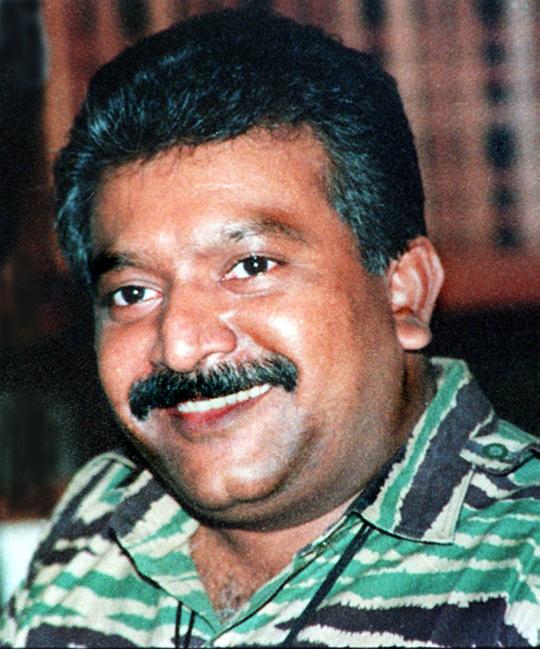
The security powers have been put fully on guard in the northern and eastern districts to counter endeavors to recognize Freedom Tigers of Tamil Eelam (LTTE) individuals killed in the contention for a Tamil country, in front of the fifteenth commemoration of the conflict's end. Occasions to respect the LTTE are arranged in spite of preclusions and uplifted observation.
Security powers have been organized to stop the celebration of the LTTE individuals who were killed in the contention for a different country for minority Tamils, a security force was conveyed in front of the commemoration of the long-drawn fight's end.
The fight began in 1983 and was finished by the country's tactical killing of the heads of the LTTE in 2009. Albeit the military ruled against sending troops, an extraordinary team of the military and the police would watch out for the conceivable LTTE remembrances from Wednesday to May 20.
According to the wellsprings of safety powers, the favorable to LTTE writing was seen circling at a few memorial occasions and there were endeavors for the restoration of the LTTE, which is under prohibition globally including adjoining nation India.
The police have rigorously declared that anybody seen attempting to recognize the LTTE would be captured. Be that as it may, Tamil political and privileges bunches say the occasions arranged are to recognize their friends and relatives, who kicked the bucket in the tedious clash since the mid-1970s.
In Mullaitivu, the site of the last fight, the really dedicatory occasion is set to occur at Vellamullivaikkal oceanfront. In Tamil-overwhelmed Jaffna, college and common gatherings started 'Mullivaikkal week' on May 11, highlighting blood gift crusades in memory of the people who died. Porridge was dispersed to review the pitiful apportions regular people got while caught during the furious fights between the LTTE and government powers in Mullaitivu.
Police revealed the capture of four people, including three ladies, in Sampur for resisting a court request that boycotts LTTE recognitions. The LTTE had worked as an equal organization in pieces of the northern and eastern locales until May 2009. The furnished struggle finished up on May 19, 2009, when LTTE pioneer Velupillai Prabakaran's body was found in the Mullaivaikkal tidal pond.
Verifiable between ethnic lopsided characteristics between the Sinhalese and Tamil populaces are asserted to have made the setting for the rise of the LTTE.
Post-autonomy Sri Lankan state run administrations tried to diminish the expanded portrayal of Tamils in government positions, prompting ethnic separation and troublesome arrangements, for example, the "Sinhala Just Demonstration" and hostility to Tamil mobs. These actions encouraged disdain and nonconformist belief systems among numerous Tamil chiefs. By the 1970s, the at first peaceful political battle for a free Tamil state developed into a vicious secessionist uprising led by the LTTE.
#breaking news#international news#news#srilanka news#srilanka weekly#world news#sri lanka#india#Forces on alert to stop Tamils from commemorating LTTE members who died in conflict
0 notes
Text
#a reminder that this is just a poll and that these countries are more than their issues and conflicts#geography#bhutan#maldives#bangladesh#sri lanka#afghanistan#india#nepal#pakistan#my polls#mayanmar
1 note
·
View note
Text
Astro obs part 9
🐌 The planets in your 12th house indicate your sleeping style:
Sun in 12th house - their sleep schedule is extremely messed up; for them, daylight hours = nighttime hours and vice versa, so they have trouble being themselves during the day; their true self comes out at night
Moon in 12th house - goes to sleep very late; full moons have a special effect on these people; their intuition is more clear at night; as kids, they probably slept a lot with their mother
Mercury in 12th house - loves texting/calling people late at night; they might journal their thoughts before sleep because they overthink a lot and it helps to clear their mind or maybe they just like to relax by reading a book at night
Venus in 12th house - cares a lot about getting their "beauty sleep"; sleeps with sleep masks on, buys expensive bed lingerie, skincare night routine might be very important; loves sleeping in general lmao
Mars in 12th house - enjoys working out before going to sleep, can go to sleep angry because they tend to get into conflict more at night than during the day
I have Uranus in 12th house and i can be both a light sleeper or a heavy sleeper, depending on where i am. For example, when i'm traveling, during the first night i wake up several times, but from the second night on i sleep like a baby lmao. Another thing would be that i can't sleep in a quiet car but i don't have any problem sleeping during a thunderstorm
🐌 Mars in fire signs (Aries, Leo, Sag) and Mars in 3rd house individuals love riding motorbikess
🐌 While Mars in 9th house peeps would probably love to go on a world tour on their motorbike. The sign ruling their 9th house represents the countries they would love to visit (i'm aware that some of these can only be visited by plane, take it with a grain of salt):
♈ in 9th house: Ireland, Poland, Japan, Zimbabwe
♉ in 9th house: Cuba, Paraguay, South Africa, East Timor
♊ in 9th house: Denmark, Norway, Sweden, Iceland, Montenegro
♋ in 9th house: Canada, USA, Bahamas, Argentina, Slovenia, Madagascar
♌ in 9th house: Hawaii, France, Italy, The Netherlands, India, South Korea, Peru, Bolivia
♍ in 9th house: Switzerland, Mexico, Brazil, Chile, Vietnam
♎ in 9th house: Belgium, Portugal, China, Equatorial Guinea, Lesotho
♏ in 9th house: Panama, Spain, Turkey, Arab countries (Saudi Arabia, UAE), Palestine, Lebanon
♐ in 9th house: Finland, Lithuania, Romania, Tanzania, Thailand
♑ in 9th house: UK, Germany, Czech Republic, Australia, Camerun
♒ in 9th house: Greece, New Zealand, Philippines, Singapore, Sri Lanka
♓ in 9th house: Morocco, Tunisia, Egypt, Mauritius, Saint Lucia

🐌 I have a feeling Pisces Suns like to spend their time in a garage lmao. Mostly because their opposing sign, Virgo, would hate to spend time in a garage due to how dirty it can get.
🐌As a 7th house Sun who's been in love for almost a year now (haha, are we surprised, ofcours not; i'm not even in a relationship with him but ugh we're so perfect for each other), i realised that Sun in 7th house people tend to behave differently with their partner when they're in a healthy relationship vs when they're in a toxic one
Sun in 7th house in:
♈ Aries in a healthy relationship: empowers their partner, knows how to balance me time vs us time in a healthy manner, encourages their partner to take safe risks
♈ Aries in an unhealthy relationship: impulsive, impatient, selfish, dismisses their partner's feelings, often controlled by rage, prone to abusing their partner
♉ Taurus in a healthy relationship: veryyy generous (their love language is gift giving), accommodating to their partner's wants and needs, cooks for their partner
♉ Taurus in an unhealthy relationship: stubborn af, hard to please, focused more on the material gain from their partner rather than the love they share
♊ Gemini in a healthy relationship: curious, always lightens the mood of their partner by cracking up tons of jokes or telling them funny stories, knows that communication is key to everything so they're not afraid to discuss serious topics, teaches their partner a lot of random stuff
♊ Gemini in an unhealthy relationship: superficial, doesn't have a problem moving on from their partner to another person in a matter of seconds, if they're still in school/college, then they prioritize studying over their partner
♋ Cancer in a healthy relationship: nurturing, knows how to balance babying their partner vs being babied by their partner, emotionally vulnerable, feels safe enough to present their partner to their family early on in the relationship
♋ Cancer in a unhealthy relationship: if they don't trust their partner, they tend to become emotionally closed off to hide their deep sadness; defensive, but if their partner attackes them, then they'll hide, worries excessively, avoids presenting their partner to their family
♌ Leo in a healthy relationship: treats their partner like the king/queen they are, keeps their ego in check so it doesn't interfere with the relationship, if they've got artistic talents (music, acting, art etc.), they'll show their love for their partner by performing in front of them
♌ Leo in an unhealthy relationship: egocentric, shows off their partner/relationship too much out of pride, often feels entitled in the relationship and wants to be put on a pedestal by their partner
♍ Virgo in a healthy relationship: selfless to a healthy degree, remembers every lil detail from every casual conversations with their partner just to please them, remembers every important date and plans ahead for it, takes care of their partner when they're sick
♍ Virgo in a unhealthy relationship: critical, overfixates on past hurts and mistakes that their partner made in the relationship (often times their partner doesn't even remember those things because they're usually not that serious), loves their pets more than their partner
♎ Libra in a healthy relationship: romantic, charismatic, truly values their partner and the relationship with them, acts fair in the relationship, teaches their partner lovingly about the importance of honesty, truth and a healthy give and take dynamic in a relationship
♎ Libra in an unhealthy relationship: doesn't prioritize the relationship; instead, they flirt with others despite being in a relationship, emotionally detached, cold and calculated in their current relationship
♏ Scorpio in a healthy relationship: loyal, loves their partner deeply and intensely, but without suffocating them, keeps their partner's secrets like they're a locked safe box with no public access
♏ Scorpio in an unhealthy relationship: obsessive, manipulative, seeks to dominate their partner, displays stalkish behaviour in the relationship, liar
♐ Sagittarius in a healthy relationship: exposes their partner to various cultures, belief systems and philosophies to expand their mind and form their own opinion on certain topics, loves freely but is still able to maintain a long-term relationship, improves their partner's mood, usually brings an element of surprise and excitement to the relationship
♐ Sagittarius in an unhealthy relationship: travels in order to avoid dealing with their partner, parties a bit too much, doesn't take the relationship seriously
♑ Capricorn in a healthy relationship: loves their partner in a mature, serious and secure manner, doesn't shy away from improving their partner's social status and/or career if they can, discusses plans for the future (getting married, having kids, adopting pets, buying a house) with their partner early on in the relationship, they make time for their partner, despite the fact that they're busy most of the time
♑ Capricorn in an unhealthy relationship: displays no emotions or physical affection in the relationship, has a hard time communicating their thoughts with their partner, settles in a relationship for the wrong reasons (money/kids/safety/"i'm getting old and i need to have my life established"), prioritizes work/career over their partner
♒ Aquarius in a healthy relationship: flexible, makes their partner's dreams and aspirations come true (whether they're related to the relationship or not), has got a very open-minded attitude towards their partner's opinions, lifestyle and identity, takes the time to become friends firsts with their future partner because they value a relationship built on solid foundation (often times their partner is also their best friend), knows how to balance couple time vs time with friends
♒ Aquarius in an unhealthy relationship: displays wishy-washy behaviour, emotionally detached, prioritizes their friends over their partner, seeks online validation from strangers and acquaintances to fulfill their needs
♓ Pisces in a healthy relationship: sensitive to their partner's emotions, knows how to balance wearing their heart on their sleeve vs hiding their emotions in unfavourable circumstances, always honest with their partner
♓ Pisces in an unhealthy relationship: prone to drown their relationship problems and sorrows in alcohol, drugs and meds for mental health issues, runs away from problems instead of dealing with them with their partner, displays dishonesty to a fault, prone to self-sabotage
#astro#astro community#astro placements#astrology#astro observations#astro posts#astro notes#astro blog#astroblr#astrology notes#astrology observations#natal chart#sun in 7th house#sun in 12th#12th house#mars in 3rd house#mars in 9th house
1K notes
·
View notes
Text
On March 2, just days before the meeting, Lu had been questioned at a Senate Foreign Relations Committee hearing over the neutrality of India, Sri Lanka, and Pakistan in the Ukraine conflict. [...]
The day before the meeting, Khan addressed a rally and responded directly to European calls that Pakistan rally behind Ukraine. “Are we your slaves?” Khan thundered to the crowd. “What do you think of us? That we are your slaves and that we will do whatever you ask of us?” he asked. “We are friends of Russia, and we are also friends of the United States. We are friends of China and Europe. We are not part of any alliance.” [...] The day after the meeting, on March 8, Khan’s opponents in Parliament moved forward with a key procedural step toward the no-confidence vote.
[...] In recent months, the military-led government cracked down not just on dissidents but also on suspected leakers inside its own institutions, passing a law last week that authorizes warrantless searches and lengthy jail terms for whistleblowers. Shaken by the public display of support for Khan — expressed in a series of mass protests and riots this May — the military has also enshrined authoritarian powers for itself that drastically reduce civil liberties, criminalize criticism of the military, expand the institution’s already expansive role in the country’s economy, and give military leaders a permanent veto over political and civil affairs.
[...] On balance, the text of the cypher strongly suggests that the U.S. encouraged Khan’s removal. According to the cable, while Lu did not directly order Khan to be taken out of office, he said that Pakistan would suffer severe consequences, including international isolation, if Khan were to stay on as prime minister, while simultaneously hinting at rewards for his removal. The remarks appear to have been taken as a signal for the Pakistani military to act.
532 notes
·
View notes
Text
Dandelion News - October 22-28
Like these weekly compilations? Tip me at $kaybarr1735 or check out my Dandelion Doodles on Patreon!
1. Industrial wastelands to wildlife oases: Five nature wins that have actually worked
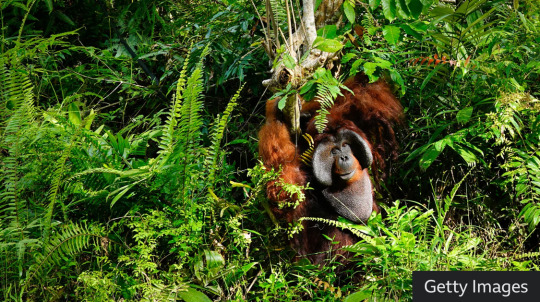
“[An archipelago in the Indian ocean] experienced a major whale comeback after signing up to a debt for nature swap[….] In Sri Lanka's capital of Colombo, local efforts have transformed what was once a rubbish dump to a wetland teeming with [wildlife….]”
2. Louisville launches America’s first 100% electric garbage truck fleet

““These innovative EV collection trucks will fulfill our trash, compost and recycling needs, reduce noise pollution, and include larger windshields to increase each driver’s field of vision and lower greenhouse gas emissions[….]” [The trucks are equipped with] audible devices that alert nearby drivers and pedestrians to compensate for their quieter operations.”
3. How a nearly extinct crocodile species returned from the brink in Cambodia

“By the late nineties, [Siamese crocodiles] were thought to be extinct. […] Today there are about 1,000 Siamese crocodiles in the wild[….] The first crocodiles were reintroduced into the wild in 2012 and they have begun breeding in the wild: over a hundred eggs were discovered in the forests in July, the most so far.”
4. Before his death, this conservative combat veteran filmed a PSA advocating for his transgender son

““Eric [“a conservative South Carolina U.S. Army combat veteran and father of a transgender child”] believed in the importance of freedom for trans kids — the right to live authentically and without fear,” [his widow] said. “He saw this not as a political issue but as a human one, recognizing that every child deserves the chance to thrive and feel whole.”” [Curator’s note: obviously, utmost condolences to Eric’s family; I’m including this as good news because it’s impactful to see a respectable member of the political party more often known for transmisia instead publicly advocating for his son’s human - not just political - rights]
5. Azores to create largest Marine Protected Area in North Atlantic – and a 'blueprint' for the rest of the world

““The Azores’ waters are a hotspot for marine life, hosting a third of the world's whale and dolphin species,[…” and harbouring] “cold-water corals and sponge fields that act as nurseries and feeding grounds for countless species, from deep-sea sharks to commercially valuable fish stocks.””
6. ‘It’s a big lever for change’: the radical contract protecting Hamburg’s green space
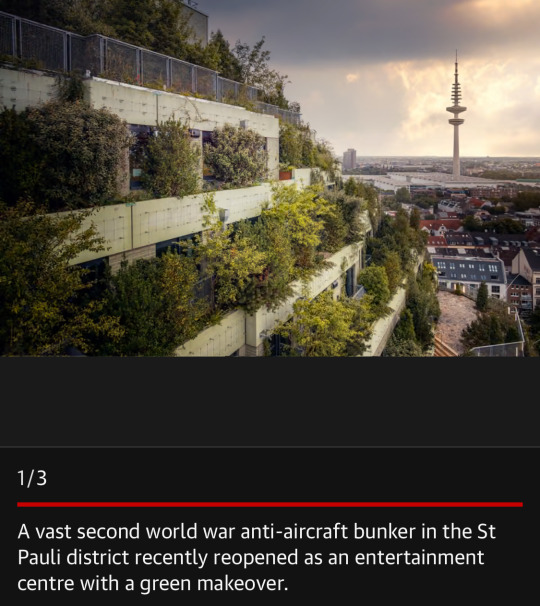
“Citizen power forced Germany’s greenest city-state into a binding agreement balancing housing and nature[….] The authorities signed an agreement with the citizen’s initiative to protect 30% of Hamburg’s land area – 10% as untouchable nature reserves and 20% with a looser conservation status – and ensure the share of public green space in the city rises over time.”
7. Behind the Scenes at the Federal Bee Lab Powered by Native Plants
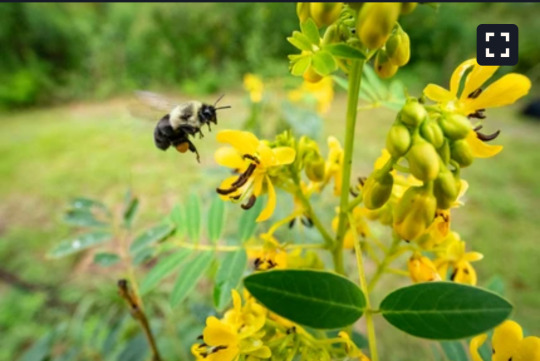
“Once native plants reappeared at the lab, he says, the impact was dramatic. In the first year, many of the region’s 200 native bee species arrived in droves. [… B]irds Droege had never before seen on the premises began to turn up to feed on the native plant seeds[….]”
8. Atlanta neighborhood hired case manager to address rising homelessness. It's improving health and safety for everyone

“Michael Nolan, an Intown Cares social worker, is trained in an approach that emphasizes individual autonomy and dignity, recognizes that being homeless is a traumatic experience, and prioritizes access to housing. [… H]iring a social worker has enabled East Atlanta Village to resolve conflicts gently, through conversation and negotiation.”
9. Loggerhead Sea Turtle Nests Make a Remarkable Comeback in Greece

“As long-lived and migratory species, [loggerheads] contribute to the health of seagrass beds and coral reefs, which are vital habitats for many marine organisms. Their nesting activities also contribute to beach ecosystems and help promote biodiversity.”
10. Rapid genome analysis of a Whippet sighthound sets new standard for biodiversity research

“[Scientists] have sequenced and analyzed the complete genome of a Whippet sighthound in less than a week. […] Rapid analysis is increasingly important for the conservation of endangered species, [… giving] insights into their biological relationships, evolution and adaptations to environmental conditions.”
October 15-21 news here | (all credit for images and written material can be found at the source linked; I don’t claim credit for anything but curating.)
#hopepunk#good news#conservation#wildlife#habitat#habitat restoration#electric vehicles#waste management#crocodiles#reptiles#conservatives#veterans#trans rights#protect trans kids#human rights#ocean#whale#dolphin#shark#coral reef#germany#native plants#native bees#bees#homelessness#homeless#unhoused#sea turtle#dogs#genetics
40 notes
·
View notes
Text
“Gender wars in 2024 is insane 😭🙏”
Ok here is list of other things that happened in 2024:
Asia
1. January 15 - Bangladesh: A woman was killed by her husband after requesting a divorce.
2. February 5 - India: A brutal attack in Uttar Pradesh left a woman mutilated.
3. March 23 - Pakistan: A woman was murdered by her husband in Punjab in a femicide case.
4. April 14 - Nepal: A woman was assaulted by her partner; her family reported prolonged abuse.
5. May 3 - Malaysia: A woman was beaten to death by her partner.
6. June 21 - China: A woman was severely injured in an attack at a restaurant in Tangshan.
7. August 9 - Philippines: Several women were sexually assaulted during a party.
8. September 28 - Kazakhstan: A woman was murdered by her ex-partner in a femicide case.
9. October 15 - Sri Lanka: A woman was murdered by her husband in Colombo.
Africa
1. January - South Africa: A woman was murdered by her partner, sparking protests in Pretoria.
2. January - Kenya: At least 10 women were murdered in femicide cases; protests erupted in Nairobi.
3. February - Malawi: A woman was killed by her partner after trying to leave him.
4. February - Tanzania: A women’s rights activist was attacked by her ex-partner.
5. March - Nigeria: A woman was found dead in Oyo, in a suspected femicide case.
6. March - South Africa: A young woman was murdered in a rural area, leading to protests.
7. April - Kenya: Over 500 femicides reported since 2016, sparking outrage.
8. May - South Sudan: A woman was raped and killed during an armed conflict.
9. June - Uganda: A woman was attacked and murdered by her partner in Kampala.
10. July - Ethiopia: A series of women were killed in rural areas, raising concerns of femicide.
Europe
1. February 12 - Spain: A 45-year-old woman was murdered by her partner in Barcelona.
2. March 4 - France: A femicide in Lyon where a woman was stabbed by her husband.
3. April 20 - Italy: A woman was killed in Rome by her ex-partner after reporting him.
4. June 7 - Germany: A femicide in Berlin where a woman was murdered by her husband.
5. July 29 - United Kingdom: A woman was murdered by her boyfriend in a prolonged abuse case.
6. August 15 - Poland: A woman was murdered in Warsaw by her partner in a femicide case.
7. September 10 - Spain: A young woman was found dead in Madrid after reporting domestic violence.
8. October 18 - France: A femicide in Marseille; the woman had previously reported abuse.
North America
1. January - United States: A woman was murdered in Texas by her partner, despite having a restraining order.
2. February - Canada: A femicide in Toronto, where a woman was murdered by her ex-boyfriend after trying to leave the relationship.
3. March - United States: A woman was killed by her husband in a Chicago suburb in a domestic violence case.
4. April - Canada: A femicide in Montreal, where a woman was attacked by her partner after reporting abuse.
5. May - United States: A femicide in California; a woman was murdered by her partner in front of her children.
6. June - Canada: A woman was murdered by her husband in Vancouver after years of abuse.
7. July - United States: A woman was murdered in New York by her partner in an attack caught on video.
8. August - Canada: A femicide in Alberta; a woman was found murdered in her home by her husband.
9. September - United States: A woman was killed by her partner in Florida, highlighting the ineffectiveness of protective laws.
10. October - Canada: A femicide in Ottawa; a woman was murdered after months of harassment by her ex-partner.
South America
1. January 14 - Argentina: A 24-year-old woman was killed by her ex-partner in Buenos Aires after months of harassment. The case sparked protests demanding stronger measures to protect women.
2. February 9 - Colombia: In Bogotá, a woman was murdered by her husband, who had a history of domestic abuse. The victim had filed multiple complaints but received little protection.
3. March 3 - Brazil: A femicide occurred in Rio de Janeiro, where a young woman was found dead after being attacked by her partner. The country’s high rates of violence against women remain a significant concern.
4. April 20 - Chile: A woman was killed by her ex-boyfriend in Santiago. The incident highlighted the growing issue of intimate partner violence, with activists calling for increased enforcement of protective measures.
5. May 15 - Peru: A 30-year-old woman was murdered by her spouse in Lima after years of documented domestic abuse. The case ignited a public outcry for better legal responses to gender-based violence.
6. June 4 - Bolivia: A woman was killed in La Paz by her partner, who had previously been reported for abusive behavior. Her death added to the growing number of femicides in Bolivia.
7. July 10 - Ecuador: In Quito, a woman was murdered by her husband in a case of domestic violence. The incident underscored the country’s challenges in addressing violence against women, despite existing laws.
8. August 8 - Uruguay: A woman was brutally attacked and killed by her ex-partner in Montevideo. The case raised concerns about the effectiveness of restraining orders and protective laws in the country.
9. September 25 - Paraguay: A young woman was found dead after being assaulted by her partner in Asunción. The case prompted discussions on the inadequacies of the justice system in dealing with gender-based violence.
10. October 13 - Venezuela: A woman was murdered by her husband in Caracas. The case shed light on the country’s increasing rates of domestic violence, which have been exacerbated by economic instability.
Global
1. February - India: A woman was murdered by her obsessive ex-boyfriend in New Delhi.
2. March - Brazil: A femicide in São Paulo, where a woman was murdered by her partner.
3. April - Turkey: A woman was killed in an honor killing in Istanbul.
4. May - South Africa: A femicide in Cape Town where a young woman’s body was discovered.
5. June - Nigeria: A woman was raped and murdered in a rural area, sparking protests.
6. July - Mexico: A student was abducted and murdered, raising alarm over violence in the country.
7. August - Philippines: A woman was murdered by her husband in a domestic violence case.
8. September - Afghanistan: Increased violence against women in rural areas, including forced marriages.
9. October - Pakistan: A woman was murdered in a suspected honor killing.
#radical feminism#radical feminist community#radblr#radical feminst#radical feminist safe#radical feminists please interact#radical misandrist#radfeminism#trans exclusionary radical feminist#radical feminist#female rage#real feminism#riot grrrl#radfemsafe#radical feminists do interact#radical feminists do touch#radical feminists please touch#punk feminist#feminicide#fight the patriarchy#angry feminist#feminism#terfblr#terfsafe#terf
41 notes
·
View notes
Text
youtube
@EinatWilfUnofficial
1 day ago (edited)Despite Israel being a tiny country with limited resources, surrounded by enemies, it absolutely does send aid all over the world including to official enemy states like Syria. Here is a partial list of the countries Israel sent aid to, as mentioned in the summary of IDF humanitarian missions:
1. Greece (1953, 1999): Assisted survivors of an earthquake in the Ionian Islands in 1953 and supported search and rescue efforts after the Athens earthquake in 1999.
2. Cambodia (1975): Provided medical care to refugees from the Cambodian-Vietnamese conflict near the Cambodian-Thai border.
3. Mexico (1985, 2017): Sent rescue teams after the devastating 1985 Mexico City earthquake and supported damage assessments and relief efforts following the 2017 earthquake.
4. Armenia (1988): Deployed rescue workers and medical aid following a massive earthquake in Gyumri.
5. Romania (1989): Delivered medical supplies and assistance during the Romanian revolution.
6. Croatia (1992): Sent humanitarian aid to Zagreb for those affected by the Bosnian civil war.
7. Argentina (1994): Assisted in search and rescue operations after a Hezbollah bombing at the AMIA building in Buenos Aires.
8. Democratic Republic of Congo (1994): Established a field hospital and provided supplies for refugees of the Rwandan Civil War in Goma.
9. Kenya (1998, 2006): Helped after the US embassy bombing in Nairobi in 1998 and a building collapse in 2006.
10. Turkey (1999, 2011, 2023): Conducted rescue operations and medical care after major earthquakes in İzmit (1999), Erciş (2011), and Türkiye (2023).
11. India (2001): Treated thousands and set up a field hospital after the Gujarat earthquake.
12. Egypt (2004): Assisted after the Taba Hilton bombing with medical and rescue teams.
13. Sri Lanka (2004): Provided medical supplies and aid after the devastating tsunami.
14. United States (2005, 2021): Delivered humanitarian supplies after Hurricane Katrina in 2005 and aided search and rescue in Surfside, Miami, in 2021.
15. Japan (2011): Treated patients and established a field clinic after the earthquake and tsunami in Minamisanriku.
16. Bulgaria (2012): Provided medical assistance following a Hezbollah bus bombing in Burgas.
17. Ghana (2012): Rescued survivors after a department store collapse in Accra.
18. Philippines (2013): Conducted extensive medical and rescue operations after Typhoon Haiyan.
19. Nepal (2015): Treated thousands and established a field hospital after a massive earthquake in Kathmandu.
20. Syria (2016–2018): Provided medical and humanitarian aid to Syrian civilians during the civil war via Operation Good Neighbor.
21. Brazil (2019): Assisted in search and rescue operations after the Brumadinho dam collapse.
22. Albania (2019): Helped repair and assess structural damage after a major earthquake.
23. Honduras (2020): Supported recovery efforts following two devastating hurricanes.
24. Equatorial Guinea (2021): Delivered medical aid and conducted rescue operations after a series of explosions in Nkoa Ntoma.
25. Ukraine: Constructed a field hospital to treat civilians following Russia declaring war.
#natasha hausdorff#cenk uygur#israeli aid#natasha hausdorff cenk uygur debate#hamas#gaza#debate#einat wilf#Youtube
16 notes
·
View notes
Text
I've seen arguing over how many people were slaughtered on Oct 7 itself. IDK the exact answer, because from what I've gathered, no one does so far. The last time I saw an article addressing the forensic work on this (which was about a week ago), it said 1,248 people had been identified, but I know there have been victims of the massacre identified since, I know there's still the unidentified victims to take into account, and the missing people (those that we can't know yet whether they'd been murdered on that day, kidnapped, or murdered and their body was kidnapped). There have been some bodies that were brought in together with all the rest, but were then identified as Hamas terrorists (my guess is their bodies weren't among those the forensic experts struggled to identify, unlike the bodies of their victims, often mutilated and burnt beyond recognition). Based on the number identified already, and the number of bodies still unidentified, over two months after the massacre, I find it hard to believe that the final number of Oct 7 victims will be less than 1,300 people. But like I said, nobody knows, there's still no official number, not until either the work of identification will be done, or until it's confirmed that there are no more ways to identify the remaining victims of Hamas' slaughter.
Even before the final number, it is the biggest massacre of Jews since the Holocaust, it is the second deadliest terrorist attack ever (if we take the lowest possible number of fatalities. The worst one is Sep 11, when 2,996 Americans were murdered by al-Qaeda), and the deadliest one ever if we adjust the number of victims to the attacked country's population size (if we take the not final figure of 1,248 people massacred on Oct 7, once adjusted for population size, this would be roughly equivalent to over 42,500 Americans murdered, meaning that for the Israeli population, this is over 14 times the scale of the Sep 11 attacks). Think about the number of Israelis (and Jews) impacted by this attack, before we start talking about the over 5,000 people injured on Oct 7, or those kidnapped. Hamas' massacre is also the single bloodiest day in the history of the Israeli-Arab conflict for one side. So anyone telling you that the Palestinians have been "suffering Oct 7 every single day for years," is either incredibly ignorant, or straight up lying. Anyone who knows the history of the conflict, or of terrorism, knows that there is no underestimating the unique brutality of Hamas' massacre.
Out of the people massacred on Oct 7, who were not Israeli citizens, there were at least: 39 victims from Thailand, 10 from Nepal, 4 from the Philippines, 3 from China, 2 from The United Kingdom, 2 from Sri Lanka, 1 from Canada, 1 from Cambodia, 1 from Germany, 1 from Moldova, 1 from The United States, 1 from Tanzania, and 1 from Eritrea. Altogether, at least 67 foreign nationals.
At least 26 people have been killed by direct rocket hits, of which at least 15 were killed on Oct 7. At least 20 were killed by Hamas and PIJ (Palestinian Islamic Jihad) rockets from Gaza, and at least 6 by Hezbollah rockets from Lebanon. Of the 26 known victims of rocket fire, 2 were citizens of Thailand, 14 were Israeli Jews, and 10 were Israeli Arabs. This doesn't reflect the full effect of the rockets on Oct 7, since the fate of many people was sealed when they started fleeing the barrage of around 4,000 rockets fired into Israel, only to run straight into ambushes set up by Hamas terrorists, like many of the Nova music festival victims, where over 360 people were murdered.
This is 5 years old Yazan Abu Jama'a, who was killed by a direct rocket hit on Oct 7:

I think the worst part about this post is writing "at least" so many times, knowing that every single one of these figures may be updated with a greater number.
(for all of my updates and ask replies regarding Israel, click here)
#israel#antisemitism#israeli#israel news#israel under attack#israel under fire#israelunderattack#terrorism#anti terrorism#hamas#antisemitic#antisemites#jews#jew#judaism#jumblr#frumblr#jewish
123 notes
·
View notes
Text
Many thousands of civilians have reportedly been killed. The number of people displaced from their homes is well into seven figures. Densely populated urban areas have been reduced to rubble. Supplies of electricity, food, and water have been cut off. Hospitals have come under attack. Many of those fleeing, injured, or dead are children.
I could be describing Russia’s full-scale invasion of Ukraine, which has raged on for almost two years now, or the terrible human costs of Israel’s military offensive in the Gaza Strip following the horrific Hamas attacks on Oct. 7. But I am referring to a conflict that has received much less international attention: the civil war in Sudan that broke out last April. Even as one lethal war captures the world’s attention, others roil on in the background.
Unsurprisingly, given its geopolitical significance, Ukraine has received considerable attention in the West, where leaders have been quick to condemn Russia’s war crimes. The new conflict in the Middle East has dominated headlines over the past couple of months. But Sudan’s crisis has gone woefully underdiscussed, like many others that for various circumstantial, political, or geographic reasons seem to matter less to the international community.
The West likes to think it has abandoned the racist habit of ascribing different value to human life in different places. We profess our respect for international law, which codifies the principle of equality. But in practice, our behavior does not always reflect this. Accusations of double standards from non-Western counterparts sting precisely because they have a point.
This is not to advocate for a zero-sum redistribution of attention and diplomatic energy from one conflict to another. Nor is it to say that we should care any less about innocent people killed, for example, in Kharkiv than those killed in Khan Yunis or Khartoum. Instead, more than 75 years after the United Nations adopted the Universal Declaration of Human Rights, the international community needs to rediscover the tradition of humanitarian universalism. We must avow in word and deed that all human lives possess the same value and that the killing of civilians is unacceptable wherever it occurs.
Never before in recent memory has this been more urgent. The world has entered what David Miliband, the president and CEO of the International Rescue Committee, has called an “age of impunity.” War crimes often go unpunished. Nations increasingly disregard the laws of war: Torture, sexual violence, acts of collective punishment, and indiscriminate destruction of civilian homes and services are tragically common.
In a fragmenting international order, old mechanisms such as naming and shaming no longer work. Multilateral peacekeeping operations are in decline. These days, when wars do end, it is more often the result of one side vanquishing the other than a negotiated settlement. This new disorder arrived gradually—as the optimism of the immediate post-Cold War era gave way to new wars, power shifts, and then global economic crisis in the 2000s—and then accelerated in the early 2020s.
Wars are now more frequent, they are lasting longer, and they are killing more people. In 2022, more than 200,000 people died in state-based conflicts globally—the highest death toll since 1986 (excluding unilateral acts of violence such as the Rwandan genocide). Mass civilian casualties in recent years include the massacres of Tamils in Sri Lanka; the killing of tens of thousands of civilians in Yemen; and the deaths of hundreds of thousands of people in Ethiopia’s Tigray region. Such conflicts are forcing more civilians to flee, which is one of several factors that has driven the number of displaced people worldwide to a record 114 million.
Open Society Foundations, the philanthropy I run, provides funding to several of the largest humanitarian organizations to support their work on these overlooked conflicts. We also fund a range of advocacy and policy groups working to bring attention to the roots of these crises and mobilize the political will to address them. But this work can feel like a drop in the ocean. It needs more funding and scaled-up operations, particularly at a time when there is less news coverage of international conflicts, as media outlets have fewer resources to send foreign correspondents to distant war zones. When these conflicts are out of public sight, they too easily become out of mind for officials and politicians.
The time has come, then, for a new universalist global campaign for solidarity with victims of conflict everywhere that reestablishes the norm of equally valuable human life. This may seem like an obvious principle, woven as it is through the constitutions of multilateral institutions such as the U.N. But it is evidently getting lost in today’s world.
Civil society activists capable of crossing national and partisan divides should lead this campaign. They should cooperate with existing multinational institutions, such as the U.N.; nongovernmental organizations, such as ONE Campaign and Amnesty International; and far-sighted cultural and media figures with the reach needed to build momentum.
This global campaign should demand deeper pools of core funding for emergency aid, especially from groups of national governments, ensuring that aid responses do not depend merely on media attention or the largesse of individual governments. It should challenge both media and government to widen their attention spans and scope for empathy. And it should also demand swifter multilateral responses to crises, including by pressuring the U.N. Security Council to speak out immediately for basic humanitarian principles rather than deliberating for weeks.
Perhaps most fundamentally, the campaign should draw in a network of civil society groups, cultural leaders, and new generations of human rights champions to proclaim: no more hierarchies of civilian suffering, no more double standards, no more selective blind spots.
In an age of multiplying and interlocking crises, the international community must find room for solidarity for more than one or two benighted groups at a time. Global civil society should convene, whether in person or online, to launch this new campaign and reassert fundamental but increasingly sidelined principles of equality, solidarity, and shared humanity. As the English poet John Donne put it: “Any man’s death diminishes me, because I am involved in mankind.”
77 notes
·
View notes
Text
I’ve been meaning to make a post like this for a while, so here are some fiction anti-colonial/anti-apartheid/anti-genocide books that I read for the cultural studies concentration of my literature degree, that I think are super readable/accessible and don’t see recommended often:
1. The Association of Small Bombs by Karan Mahajan

A novel about a boy who was a victim of a terrorist attack as a child and how he becomes radicalized by the same terrorist group that killed his friends as a young adult.
Additional/background reading:
youtube
2. The Story of a Brief Marriage by Anuk Arudpragasam
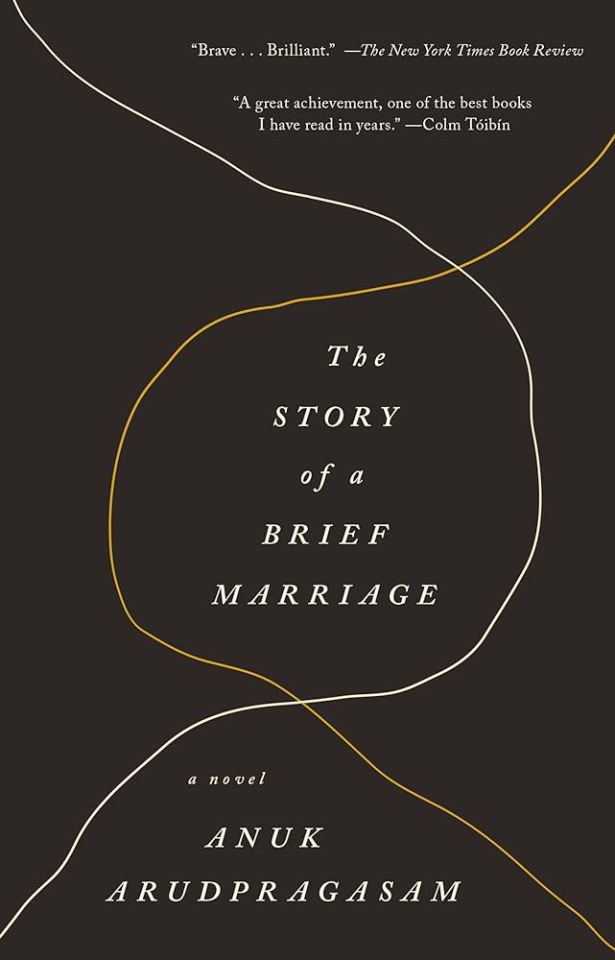
a 24 hour snapshot of the last few weeks of the Sri Lankan civil war where the Sri Lankan goverment bombed a no fire zone, killing as many as 70,000 civilians, the vast majority of whom belonged to the Tamil ethnic minority. (this book is extremely graphic but very worth reading imo)
Background/additional reading:
3. White Teeth by Zadie Smith

A post-colonial novel spanning several decades centering on two WWII veterans living in Britain; one a white Englishman, one a Bangladeshi immigrant.
additional/background reading:
4. An Imperfect Blessing by Nadia Davis

A novel about the Indian community in South Africa, told primarily through the lens of a teenage girl and taking place during the dissolution of the apartheid state.
background/additional reading:
5. Home Fire by Kamila Shamsie

A modern retelling of Antigone set in post-9/11 Britain and Pakistan.
additional/background reading:
#decolonize your bookshelf#book rec#book list#aka a list of books that changed my brain chemistry (/pos)#im also gonna put this on twitter i think#none of these are directly related to current events but I don't think having global historical perspective hurts#and beyond that these are all really good books (imo) that can be easily added to a reading list#most of them probably dont have a long wait at your local library either since idt any of them are trendy rn
57 notes
·
View notes
Text

https://www.reuters.com/world/middle-east/israeli-airstrike-kills-eight-palestinians-gaza-refugee-camp-medics-say-2024-12-20/
6 notes
·
View notes
Text
HRH THE PRINCESS ROYAL CONCLUDES HER VISIT TO SRI LANKA

Her Royal Highness, The Princess Royal and her spouse Vice Admiral Timothy Laurence concluded a three-day official visit to Sri Lanka on Friday, 12 January 2024. The visit marked a momentous occasion celebrating the 75th Anniversary of bilateral relations between Sri Lanka and the United Kingdom and was characterized by a series of engagements that reinforced the deep ties between the two countries.
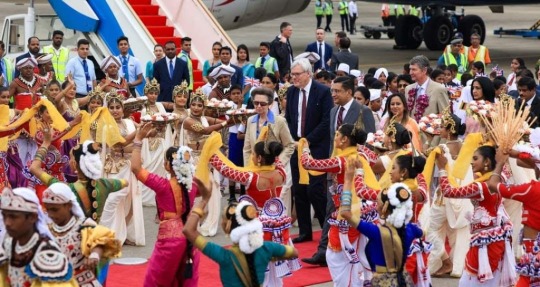
Upon their arrival on 10th January, a vibrant ceremony with a multi-cultural performance welcomed them, with Foreign Minister Ali Sabry extending warm greetings.
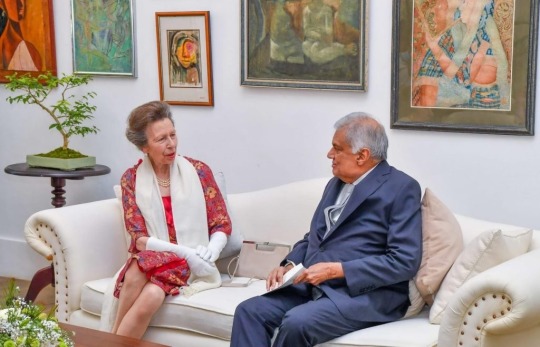
Visiting at the invitation of the Government of Sri Lanka, the official engagement kicked off with a welcome dinner hosted by President Ranil Wickremesinghe, reflecting the warm and cordial relations shared by the two countries during which Princess Royal delivered a message from His Majesty the King to the President and the people of Sri Lanka.
Addressing a gathering at the concluding reception hosted by the British High Commissioner, The Princess Royal remarked on the warm and friendly bilateral relations between the two countries and was committed to fostering cultural, economic and social connections. Foreign Minister Ali Sabry who delivered a short speech during this reception, remarked that the visit held profound significance and is a watershed moment in the 75 years of our bilateral relations with the United Kingdom. He also drew attention to the significant transformation Sri Lanka has undergone since The Princess Royal’s last visit in 1995. The Minister thanked the UK for its steadfast support for the pursuit of development and prosperity in Sri Lanka.

In Colombo, as the patron of the Save the Children Foundation, Her Royal Highness visited its office and unveiled a plaque commemorating the 50th Anniversary of ‘Save the Children’ working in Sri Lanka, and undertook a visit to the Lady Ridgeway Hospital for Children, showcasing the commitment to social causes.

Additionally, The Princess Royal toured the ‘MAS Holdings’ facility in Katunayake, a leading apparel tech company in South Asia as identified by the UK Fashion and Textile Association (UKFT), of which The Princess Royal is the President. During the tour she witnessed the state of the art technology and capabilities of the Sri Lankan apparel sector, reinforcing its role in Sri Lanka – UK trade relations.
The itinerary extended to Hatch Works, Colombo, an ICT innovation hub supporting start-ups, further highlighting the collaborative efforts in technological advancements and the promotion of entrepreneurial culture through facilitating access to essential infrastructure, knowledge, and capital. At the British Council, HRH was briefed on the ongoing work to build cultural and educational relationships between Sri Lanka and the UK and was privy to ‘The Arches of Awe exhibition’, featuring images of 21 arches built to welcome Queen Elizabeth II to Sri Lanka in 1954. As the President of the ‘Commonwealth War Graves Commission’ Princess Royal also visited the Commonwealth War Graves at Liverament Cemetery and laid a wreath to commemorate the dead in the aftermath of both World Wars I and II, symbolizing shared history and values.
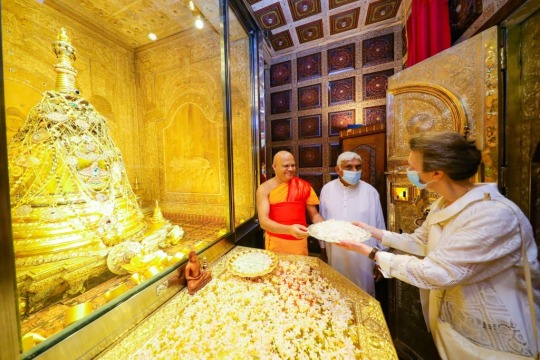
Moving to Kandy, the royal guests were welcomed by the Central Province Governor Lalith U Gamage, and were escorted to the sacred temple of the ‘Tooth Relic’, where she paid her respects.
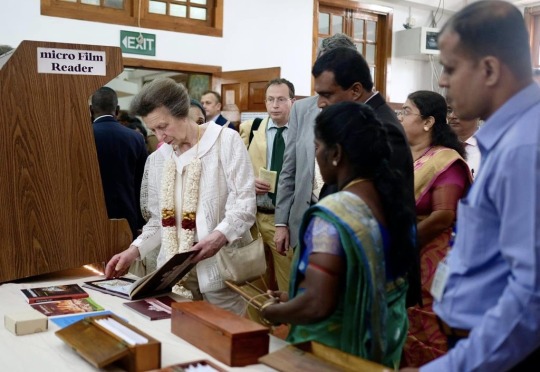
HRH The Princess Royal and Vice Admiral Timothy's visit to Jaffna marked a historic occasion, as the first-ever visit by members of the British Royal Family, where they were received by Northern Governor P. S. M. Charles. In Jaffna, the focus shifted to important aspects of post-conflict recovery visiting the Muhamalai Demining site and meeting communities resettled in mine–cleared areas in Muhamalai, signifying and reiterating the valuable contribution of donor partners, including the UK in creating a mine - free Sri Lanka. The Royals were also taken on a tour of the Jaffna Public Library recognized as a center for knowledge and cultural preservation, and met members of the local community.

During their visit, the Royal Guests also toured the Vajira Pillayar Kovil, and took part in a special pooja blessing conducted by the chief priest. Princes Royal visited the ‘Mission to Seafarers’ as the President of this movement and had an engaging conversation with its Colombo staff reiterating the importance of seafaring to Sri Lanka as a maritime nation.
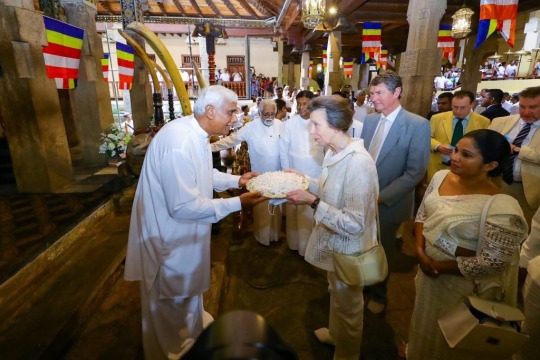
The Princess Royal first visited Sri Lanka in 1995 and this year marked her second to the Island. Sri Lanka has received members of the Royal family on seven previous occasions since 1948, including , Her Late Majesty Queen Elizabeth II who visited the island just five months after her Coronation, and that of His Majesty the King, as the Prince of Wales on three occasions.

The Ministry of Foreign Affairs worked in close coordination with the British High Commission in Colombo, which played a pivotol role in the execution of the programme assisted by the Sri Lanka High Commission in London and all other local government agencies. This historic visit by HRH The Princess Royal led to a comprehensive exploration of the diverse facets of the relationship between Sri Lanka and the United Kingdom.
Posted by Ministry of Foreign Affairs, Colombo on 13th January 2024
38 notes
·
View notes
Text
News Post
Palestine
Palestine is a glimpse of the dystopic future that awaits us | Israel-Palestine conflict | Al Jazeera
IDF operates in central Gaza Strip - Palestinian report - The Jerusalem Post (jpost.com)
Ussama Makdisi, Overwriting Palestine — Sidecar (newleftreview.org)
Iran’s response to Israel looms. What are the possible scenarios? | Israel-Palestine conflict News | Al Jazeera
Ukraine
Russia asked US to convince Ukraine not to attack it on Russia's Navy Day – media – photo | Ukrainska Pravda
Ukraine Was Poised to Destroy Russia’s Best Warplanes, but White House Restrictions Shut Their Window of Opportunity (kyivpost.com)
Russia suspected Ukrainian attack on Navy Day parade, state TV says (yahoo.com)
Ukraine's defence forces shoot down Russian helicopter over Sumy Oblast | Ukrainska Pravda
Sudan
Sudan mandates sorghum planting to avert famine as conflict disrupts agriculture - Sudan Tribune
UN Appeals for Security Council Help to Combat Famine in Sudan (usnews.com)
Why are Sudan’s warring sides blocking humanitarian aid? | Humanitarian Crises | Al Jazeera
At least 32 killed, 107 wounded due to heavy rains, floods in Sudan-Xinhua (news.cn)
Other
Biden speaks to leaders of Qatar, Egypt on regional tensions, ceasefire (yahoo.com)
Congolese police officers flee to Uganda as fighting intensifies - The East African
Africa is heading toward another deadly war - The Japan Times
Afghanistan, Pakistan, Sri Lanka and now Bangladesh: What's going on in India's neighbourhood? - Times of India (indiatimes.com)
The Taliban says people in Afghanistan on previous government's visas can stay for now | AP News
At least 13 killed and 300 evacuated after deadly landslide in southern Ethiopia (voanews.com)
Min Aung Hlaing admits pressure after Myanmar anti-coup forces claim base | Conflict News | Al Jazeera
Pentagon Hands Over Last Base in Niger as Extremism Spreads in the Sahel - The New York Times (nytimes.com)
Arson Attacks on Schools in the Sahel: Addressing the Issue through Prevention, Mitigation and Effective Response, July 2024 - Niger | ReliefWeb
#News Post#Palestine#Gaza#Free Palestine#Free Gaza#Justice for Palestine#Long Live Palestine#Ukraine#Save Ukraine#Keep Fighting For Ukraine#Victory to Ukraine#Sudan#Dafur#El Fasher#Save Sudan#Sudan Civil War#Sudan Genocide#Egypt#Congo#Afghanistan#Ethiopia#Myanmar#Sahel
10 notes
·
View notes